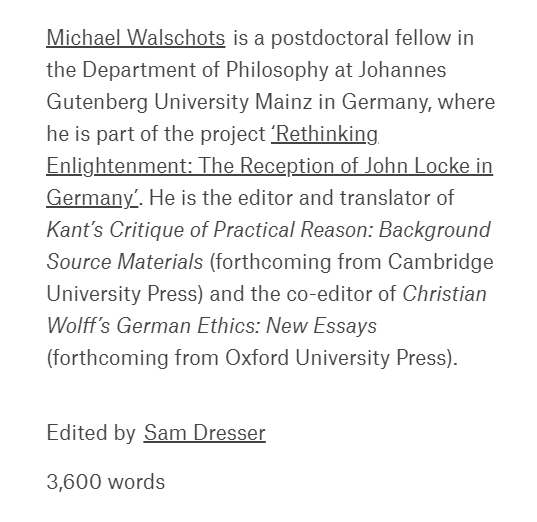Welcome to DU!
The truly grassroots left-of-center political community where regular people, not algorithms, drive the discussions and set the standards.
Join the community:
Create a free account
Support DU (and get rid of ads!):
Become a Star Member
Latest Breaking News
General Discussion
The DU Lounge
All Forums
Issue Forums
Culture Forums
Alliance Forums
Region Forums
Support Forums
Help & Search
The forgotten Enlightenment philosopher

The great, forgotten Wolff
Written for laymen, read by women and kings, Christian Wolff’s mathematical method made him a key Enlightenment philosopher
https://aeon.co/essays/why-we-should-recover-the-philosophy-of-christian-wolff


Writing primarily during the first half of the 18th century, Christian Wolff (1679-1754) and his philosophical system, ‘Wolffianism’, dominated the intellectual landscape to such an extent that during his own lifetime he became one of the most influential philosophers in all of Europe. He made substantial contributions to virtually every sub-field of philosophy (as well as to mathematics and natural science), shaped the way philosophy was practised in the German-speaking lands of Europe and beyond for decades if not centuries to come, and even had an influence on the German language itself. And yet, in the present day, Wolff is not a stable figure of the Western philosophical tradition. This is a tragedy, because Wolffianism had such an impact that a large and important piece of German philosophy’s history remains obscure unless we can come to better appreciate Wolff’s philosophy and the ideas to which it gave rise. Just how influential was Wolff’s philosophy? And how could it come to be that his philosophical system eventually became pushed into the background?
Wolff was born in Breslau, at the time the capital of the historical region of Silesia, now Wrocław in Poland. Raised in a devout Lutheran household, Wolff’s early educational environment shaped his later development in a big way: at Gymnasium, Wolff was introduced to Cartesian philosophy and mathematics and, having been exposed to disputes between Lutherans and Catholics during his youth, Wolff saw in mathematics the promise of ending these disagreements once and for all. As he writes in his autobiography: ‘I was eager to learn the mathematical method in order to endeavour to make theology incontrovertibly certain.’
The mathematical method became a cornerstone of Wolff’s philosophy, which he characterised as following three general principles: 1) beginning with clearly defined terms, and consistently using the same term for the same idea throughout one’s writings; 2) arguing strictly according to conceptual analysis and deductive inference; and 3) never using a principle as a major premise in an argument that had not been previously proven. This method embodies a faith in reason that became characteristic of the Enlightenment: by presenting his arguments in steps that ideally anyone could follow, Wolff’s hope was that all people who applied their mind to the same topic would come to agree, leading to less intellectual – and political – conflict and thus more human happiness.

Wolff’s first publication of note, a thesis from 1703 that granted him permission to teach at the university level, sought to prove the fruitfulness of the mathematical method as applied to practical philosophy in particular. Entitled Universal Practical Philosophy, Written According to the Mathematical Method, this text founded the discipline of ‘universal practical philosophy’, a general, abstract branch of knowledge that treated foundational concepts in practical philosophy, such as obligation, the nature of ‘law’ and the highest good, which were presupposed and utilised in the more particular practical disciplines of ethics, politics and economics. It was Wolff’s first success: the examiner in Leipzig, Otto Mencke, was so impressed that he sent a copy to the German polymath Gottfried Wilhelm Leibniz, which led to a correspondence and productive friendship between the two figures that lasted until Leibniz’s death in 1716. Mencke also hired Wolff to work for the Acta eruditorum, the first scientific journal for German-speaking intellectuals, for which Wolff went on to write approximately 40 papers and 485 book reviews; Wolff even learned foreign languages such as English to review works like John Locke’s Of the Conduct of the Understanding (1706).
snip
InfoView thread info, including edit history
TrashPut this thread in your Trash Can (My DU » Trash Can)
BookmarkAdd this thread to your Bookmarks (My DU » Bookmarks)
6 replies, 2113 views
ShareGet links to this post and/or share on social media
AlertAlert this post for a rule violation
PowersThere are no powers you can use on this post
EditCannot edit other people's posts
ReplyReply to this post
EditCannot edit other people's posts
Rec (32)
ReplyReply to this post
6 replies
 = new reply since forum marked as read
Highlight:
NoneDon't highlight anything
5 newestHighlight 5 most recent replies
= new reply since forum marked as read
Highlight:
NoneDon't highlight anything
5 newestHighlight 5 most recent replies
The forgotten Enlightenment philosopher (Original Post)
Celerity
Oct 2023
OP
German philosophes tend to get short shrift in surveys of the Enlightenment...
malthaussen
Oct 2023
#5
lastlib
(23,248 posts)1. Fascinating!
In all of my philosphy studies, I had never heard of him. Thanks for the post!
![]()
burrowowl
(17,641 posts)2. Very interesting
Farmer-Rick
(10,185 posts)3. I heard of him when I studied logic in college.
Part of the problem is we don't teach logic anymore.
But I never knew this about him "I was eager to learn the mathematical method in order to endeavour to make theology incontrovertibly certain."
I guess we all have blind spots. His methods made me an atheist.
jaxexpat
(6,833 posts)4. I believe I read something which mentioned him, years ago.
Now I'll be forced to google/wiki him. Piqued my curiosity. Thanks.
malthaussen
(17,204 posts)5. German philosophes tend to get short shrift in surveys of the Enlightenment...
... but if you do a bit more than survey it, Mr Wolff is not forgotten. Let's face it, for most people, just about all the philosophes of the Enlightenment are forgotten.
-- Mal
ms liberty
(8,580 posts)6. KR&B n/t